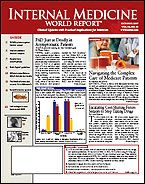Publication
Article
Internal Medicine World Report
Medicare Pulls the Plug on Common Errors in the Hospital
Author(s):
Creative Coding a Looming Problem
Creative Coding a Looming Problem
By Rebekah McCallister
New Medicare regulations that were enacted in August will end hospital reimbursement for the treatment of patients for conditions or events occurring during the hospital stay that are deemed preventable, including medical errors, injuries occurring in the hospital, and infections that develop while in the hospital. This will "change how healthcare is provided in many institutions," said Kenneth Kizer, MD, a patient safety advocate and former undersecretary for health at the Department of Veterans Affairs.
Starting in 2008, the 8 conditions for which Medicare will no longer reimburse hospitals for treatment are:
- Falls in the hospital
- Mediastinitis after coronary artery bypass graft surgery
- Urinary tract infections (UTIs) resulting from improper use of catheters
- Pressure ulcers
- Vascular infection resulting from improper use of catheters
- Objects left in the body during surgery
- Air embolisms
- Blood incompatibility.
The last 3 conditions are considered "never events," meaning that everyone agrees they should never happen in a healthcare setting.
IMWR
When asked why these regulations are being enacted now, Dr Kizer told that this is just one more step in a series of steps that the Centers for Medicare and Medicaid Services (CMS) is taking to improve the quality of care and try to make the system more accountable.
Kenneth Kizer, MD
"I think what [physicians] need to understand is that there is more to come, that this is by no means the last of this sort of thing. And while they started with 8 items, I will essentially guarantee you that the list will grow," he said.
The new regulations include protective measures to prevent hospitals from billing patients when payments are withheld and to minimize hospitals' avoidance of patients who are perceived to be at risk for infections.
Catheter-associated UTIs are the most common nosocomial infection. The Centers for Disease Control and Prevention (CDC) reports that 561,667 catheter-related UTIs occur annually. Bloodstream infections are also common in hospitals. The CDC reports that 248,678 cases of center-line?associated bloodstream infections occur every year, and the Institute for Healthcare Improvement estimates that 14,000 hospitalized patients die each year from these infections.
"Every year, millions of Americans suffer needlessly from preventable hospital infections and medical errors," said Lisa McGiffert, director of the Consumers Union's Stop Hospital Infections campaign. "These new rules are a good beginning for Medicare to use its clout to mobilize hospitals and improve care and keep patients safe."
Although these regulations may indeed improve patient care, Dr Kizer acknowledged some real reservations.
"There is some concern, although people are reticent to discuss it in public, but certainly in academic and some patient safety circles, there is concern that this smacks of being punitive, and we've been trying to foster nonpunitive approaches to encourage openness and sharing of information and public dialogue of these errors when they occur. So I think there's some concern that this will not encourage open reporting," he explains.
In addition, physicians worry that some conditions, such as bed sores, will occur even when the strictest precautions are taken.
This argument, however, does not hold water, Dr Kizer said. "Bed sores, certainly the serious grade 3 and 4 ones, are preventable. Even in very fragile patients. It's difficult, but it is doable. So I'm less sympathetic to that, because I know from clinical experience that it can be done."
Of more concern, he says, is the possibility that the new regulations will lead to "creative coding," and hospitals will start hiring consultants to find ways to get around coding the specified complications by using different codes, and will "end up getting paid anyway."
"The net effect is that [Medicare] won't achieve its desired result, and you'll be driving information underground. It will be a lose-lose situation as opposed to what could be a win-win," he said.
One way to prevent this from happening would be for CMS to require reporting of all preventable errors, Dr Kizer stressed. "If it's mandatorily reportable by everyone, then it's out there, so one hospital is not going to be disadvantaged against another, because one place found a way to code creatively, and the one down the street didn't," he said.
The bottom line, however, is that none of these errors should occur in the first place, Dr Kizer noted. "Everyone agrees you shouldn't operate on the wrong person. You can't justify that. You shouldn't give the wrong blood to somebody. You shouldn't lose babies. You shouldn't let old folks wander off and get hit on the highway. When they do, they should be reported, and someone should look into it. It's not a matter necessarily of trying to find blame, but it's a matter of trying to figure out what happened, so you can make the system work better the next time."





